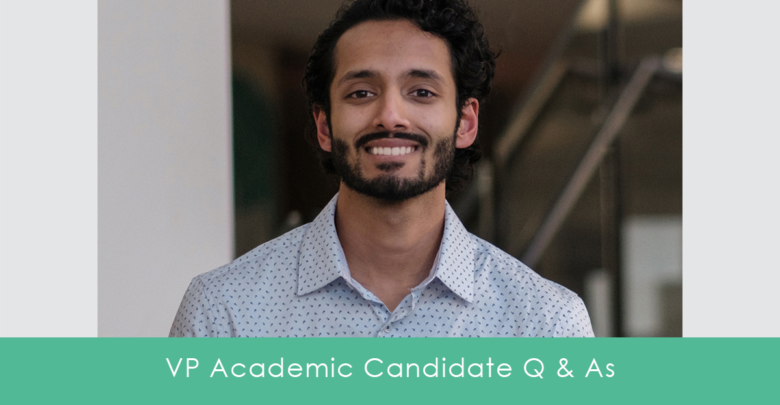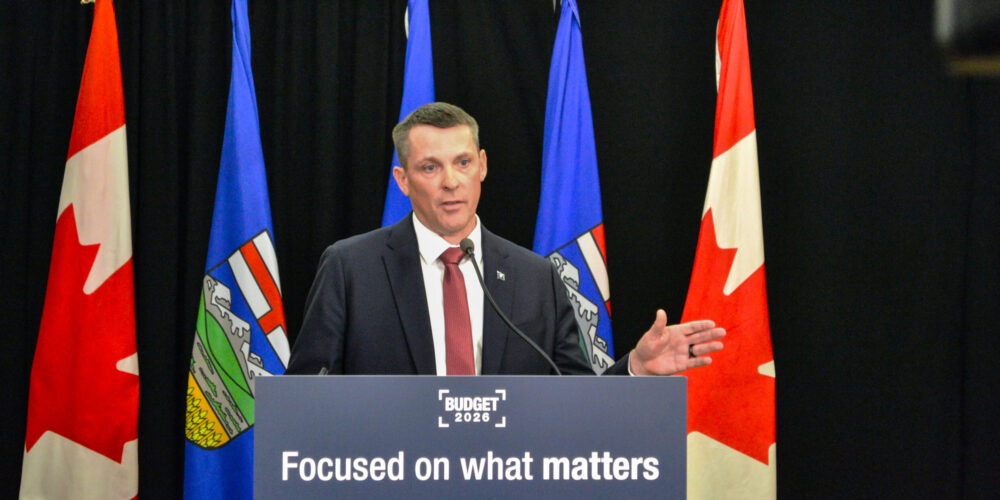SU Elections 2021 Q&A: vice-president (academic)
Monteiro is the only candidate running for the seat of vice-president (academic)
 Pia Co
Pia CoRepresenting student interests when it comes to issues of textbook affordability and teaching quality falls onto the vice-president (academic) of the Students’ Union. Part of that work involves collaborating with the various faculty and departmental associations in the university, as well as attending a number of academic committees.
This year there is a sole candidate running to address students academic concerns: Abner Monteiro, a fifth-year kinesiology student and current kinesiology, sport, and recreation councillor for Students’ Council.
Follow this link to see Monteiro’s candidate pitch video.
The following interview has been condensed and simplified for clarity.
In one minute or less, can you tell us why you are running for the position of Students’ Union vice-president (academic)?
Abner Monteiro: I consider it a privilege to serve my fellow students and to give back what my predecessors gave me — a life and a community within the university that I honestly wouldn’t trade for anything. It’s been an experience like no other here and I just want to be able to give that back.
Now, more than ever, students are struggling and my peers need someone to support them with compassion, kindness, and dedication, especially in the role of vice-president (academic). Over the past four years, I have been involved with governance and I’ve always felt limited in my capacity to make a change and solve issues for students. I would have people come up to me and tell me issues about how they feel they’re being treated unfairly in the classroom, how they’re struggling to retain knowledge and information but aren’t getting any help from their professors or university. Students are struggling to find volunteer or work experience opportunities in their field and ones that fit their needs. I’m running to change all of that.
Can you briefly and concisely describe your platform?
Monteiro: My platform consists of three components: improving students’ academic supports, empowering the student voice, and pushing for diverse learning opportunities. Each one of those points come with a particular direction I would like to take them, and tangible goals that I believe through proper advocacy can be achieved. In my time in governance and leadership, I’ve listened to so many concerns, have empathized with them, and have worked to reflect as many of those concerns as I can in my platform.
Many students have faced barriers to online learning such as online proctoring. The software used by the university is known to disadvantage marginalized and international students and there have already been calls to ban the software. How would you work with University administration and professors to find alternatives to this practice?
Monteiro: Online proctoring is a really big issue for students and it is something that needs to be addressed. I think the start of the Task Force on Remote Teaching and Learning is a great step in the right direction, but fundamentally tangible steps need to be made in order to make change for students, allowing us to make a more equitable, diverse, and inclusive (EDI) environment.
I would probably start by exploring what other universities have been doing. I know there are universities that have already banned online proctoring and are no longer using them. I would work with them and their students’ unions to see how they implemented their changes and try to bring those changes here. As well, I would work with administration and professors to look at assessments and see where alternatives can be provided for students. I think there are many different ways that students can be assessed in an effective manner that doesn’t necessarily require online proctoring.
Fundamentally online proctoring should be banned. It’s not good for students, their mental health, and it acts as a barrier to their education.
Online learning has also left many students feeling unsupported by the university and their professors. International students have complained about waking up at odd hours to attend live-lectures and receive participation marks. Though the university has created the Task Force on Remote Teaching and Learning, how will you ensure these issues are actually addressed by the university?
Monteiro: I’ve sat on a few different meetings on General Faculties Council, and I find that there are times where a lot of concerns get brought up and we discuss a lot of the issues that are going on, but we don’t ever see any tangible steps brought forward. So, one of the things I really want to see come out of the task force is a very tangible plan of action presented to students. There are already students on the task force from the Students’ Union, the International Students’ Association, and the Graduate Students’ Association who will bring these concerns to light, but we need to ensure that all students, not just executives, get to see what the plan is to tackle these issues. There needs to be a plan in action to accomplish that.
Students have complained that online learning has resulted in heavier workloads than in-person classes. Do you have any plans to advocate for a standardized workload, and if so, how?
Monteiro: Many of us enrol in classes and when we do that, we count on the fact that we have an anticipated workload and students intentionally pick certain courses because they know how much work it’s going to be and they prepare for that going into the semester. I think standardized workloads needs to come from administration, [specfically] the provosts office. The Centre for Teaching and Learning (CTL) recommends that a course has eight hours of instruction per week and right now we’re not meeting that. A lot of professors are taking advantage of the fact that we aren’t in person and are giving students more work and it’s just adding so much more work to students.
I will push the provost’s office to take the recommendations provided by CTL and request that a message be sent to deans and faculty to follow that recommendation so that students can focus on learning and not be stressed about the workloads that they didn’t even anticipate.
I believe most professors have good intentions in my experience in that if a student is unhappy with a workload, it’s as simple as coordinating with your peers and class and making it abundantly clear that the workload needs to decrease. If one person in a class expresses their distaste and they’re met with ‘I can’t help you,’ they can [see if] the majority of their class is expressing distaste for what is happening there is more likely to change. I would work with students to help them with that process while still working with administration and faculty to try to and get the workload standardized.
This year, the current vice-president (academic) tried to get the university to extend the course withdrawal date back to accommodate students, but the university refused. Do you have plans to advocate for changing any dates in the academic calendar to better accommodate students as they learn online?
Monteiro: Currently I have no plans to change any dates. The reason for extending that deadline was primarily to give students more time to evaluate the situation there were in and I think looking forward into the fall and into the future, we have much more time to prepare now. I think the focus needs to be not necessarily on pushing those dates but making sure our accommodation system is accessible for students so that they don’t have a difficult time going to the website and applying for accommodation. This was one of the things the university said they wanted students to do on an individual basis if they needed help, so that system needs to be fixed and streamlined so that students are not confused when they go to apply.
The next thing to consider is course standardization. A big reason the deadline wanted to be pushed was because students had to evaluate their situations in the first place was because they were getting so overwhelmed. Many of us when we go to enrol in courses anticipate what a typical course load is going to be for us. Students enrolled in their courses this year and when they got into their courses they realized they were getting more work than they anticipated. We know what we’re doing as students when we enrol in our courses. We are going in and saying ‘I know can handle this much work and that’s why I’m going to enrol in these many courses.’ Now students are blindsided because they’re getting way more [work] than they’re supposed to. I am going to strongly encourage the provost office to recommend to faculty and professors to accommodate students and adjust those courseloads for students, so they don’t have to worry about that course load in the first place and we don’t have to worry about pushing dates.
It took until second semester to get General Faculties Council to discuss issues students were raising with online learning. How will you ensure that student issues can be brought to GFC more efficiently?
Monteiro: I think this happens in a few ways. First, it’s about ensuring that GFC representatives are well-informed about the issues so that they have confidence when they are speaking. The more students that speak up, the higher the likelihood that the issue is taken seriously. I think when we first started off there weren’t a lot of students speaking up, so faculty and administration didn’t think it was that big of an issue. We have to make a big effort to ensure that a lot of students are speaking out on the issue.
The next thing is tone. We see most progress at GFC when our tone reflects the urgency of the issues we’re dealing with. When we are talking about lived experiences, which I think help professors and administration understand the strain students are being put under and the effect it has on their mental health, so we should really focus on that and ensuring we are delivering the message hard to them. Many members on GFC have competing interests because they have their own constituents and it’s easy for the student voice to be drowned out because of that, so we need to continue to encourage students to stand up for themselves, be there to support them and stand-up with them along the way as mentors and leaders for them. Especially as executives, we need to make sure when [students] speak they are being represented and if someone tries to limit their voice that we stand-up for them. It’s our responsibility to stand up for ourselves and our constituents.
Fun question: If you could create any course to be taught at the U of A, what would it be and why?
Monteiro: I absolutely love board games, specifically Settlers of Catan. I think I’ve put in about 70 hours to Catan universe, which is an online version of the Catan board game. Since September my friends and I have been doing that as a way to spend time together and take away from the stress of school.
I would love to have a course designed around board games and talking about their, the development, the strategy behind it, and why people enjoy them so much. It would be pretty interesting.
I also want to say that I, in no way, am being sponsored by Settlers of Catan.




